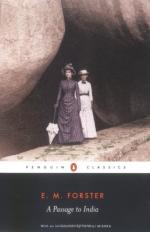|
This section contains 3,461 words (approx. 12 pages at 300 words per page) |

|
SOURCE: "Injunctions and Disjunctions," in E. M. Forster, Chelsea House Publishers, 1987, pp. 67-106.
In this excerpt, Wilde argues that Forster's acceptance of chaos, evidenced in the posthumous short stories, reflects a diminishing of Forster's vision.
When Sir Richard Conway [in "Arthur Snatchfold"], surveying the remainder of his dull, country weekend, thinks to himself: "The visit, like the view, threatened monotony," he gives perfect expression to Forster's sense of ordinary existence in The Life to Come. Not the metaphysical terror of the caves [in A Passage to India] but the monotony of "normal" life serves as the background of these stories, and their heroes, unlike Mrs. Moore or Fielding, who react by a movement inward, accept that monotony as an inevitable part of life's texture, while actively accommodating themselves to what are now seen (in a dramatic reversal of Forster's attitude in his last novel) as the intermittent pleasures...
|
This section contains 3,461 words (approx. 12 pages at 300 words per page) |

|


